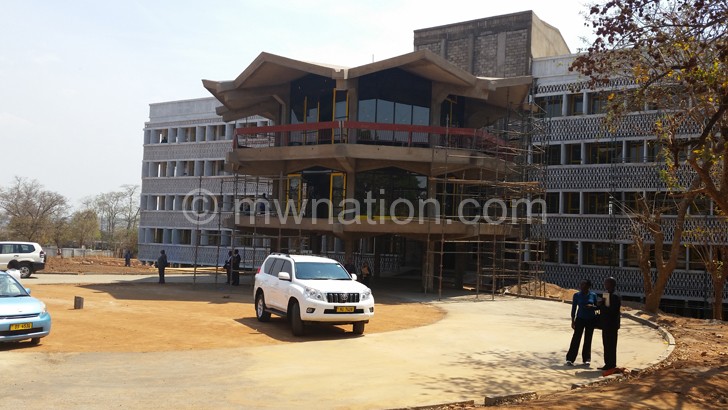Govt office complex costs 3 times more
New government offices in Lilongwe is a latest case of delayed projects that continue to waste taxpayers’ money after its cost jumped by over 250 percent, from the initial cost of K700 million.
According to minutes Nation on Sunday has seen, taxpayers have so far paid K2.5 billion for the new office building at Capital Hill a project that former president Bingu wa Mutharika commissioned in 2008 and whose completion date was 2013.

But both Treasury and Ministry of Lands have attributed the rising cost and the delay to financial constrains.
Experts, however, argue that the delay speaks volume of government’s inefficiency in project management.
Ministry of Lands, Housing and Urban Development spokesperson Charles Vintulla told Nation on Sunday in an interview that the delay has impacted on the initial budget of the project.
“K700 million was the initial budget for the project and that was eight years ago. However, there have been several economic factors that impacted on the budget over the years, and that figure has obviously changed,” he said.
Asked why the project has gone beyond the set time, Vintulla said it is funded by government; hence, the speed of construction is dependent on availability of funds.
“One of the reasons attributed to the delays was the massive devaluation of the kwacha ahead of 2013, which was more than 100 percent. Be mindful that that devaluation had serious implications on the construction industry as most projects had halted that time,” he said.
Ministry of Finance spokesperson David Sado in an e-mail response also attributed the rising cost of the project to interest charges and price escalation linked to imported construction materials.
“Delays have been there due to resource constraints in terms of timely disbursements. The project is estimated to cost K2.1 billion [after factoring in all issues]. The main factor of the increased cost is price escalations as this is linked to imported construction materials. Indeed the cost has almost tripled due to the factors cited,” said Sado.
Engineer Newton Kambala, who also owns Mkaka Construction Company, argued that there is a lot of inefficiency in management of projects in government.
“If the same [project] was done by the private sector, it would have been completed on time. This is the reason I think government should not get involved in things they cannot do.
“There is a lot of sense of ownership in private sector than in public service. Secondly, you must also know that some projects have been used to swindle government resources by taking long so that they can adjust the cost. And in this case, we are talking of more than three times the original cost. This is a way to swindle government resources,” he said.
Bina Mhango, another construction industry expert familiar with project management, said government already envisaged source of funding when the project was being set up; hence it could not cite lack of funds as a reason for project delay.
Mhango said while devaluation of the kwacha may have impacted on the cost, the delay of over four years is a sign of negligence on the part of government.
“Delaying for over four years does not sound sensible. Someone must be sleeping on the job. If this building was a priority, government would have asked the contractor to finance the project and pay them with an interest that way we could have avoided the huge expenditure which has come due to the delay.
“Better still, government would have sourced money from elsewhere to complete the building on time and spend less. But what has happened is total negligence which brings about suspicion that maybe the project is used to siphon money from the system,” he said.
Projects that missed deadline, and whose cost skyrocketed, include the 50-kilometre Nsanje-Bangula Road, the Zomba-Jali-Phalombe-Chitakale Road, construction works at Dedza and Machinga secondary schools, Phalombe District Hospital and Reserve Bank of Malawi (RBM) Mzuzu Branch.
The cost of the RBM branch tripled from K5.2 billion to K18.4 billion.
The new Capital Hill building is expected to ease pressure on government’s office space.
Government has had a tough ride with private landlords with evictions experienced more than once due to failure to pay rentals on time.
According to financial records Nation on Sunday has seen, Capital Hill spends over K10 billion annually on rentals, an amount which may significantly be reduced.





